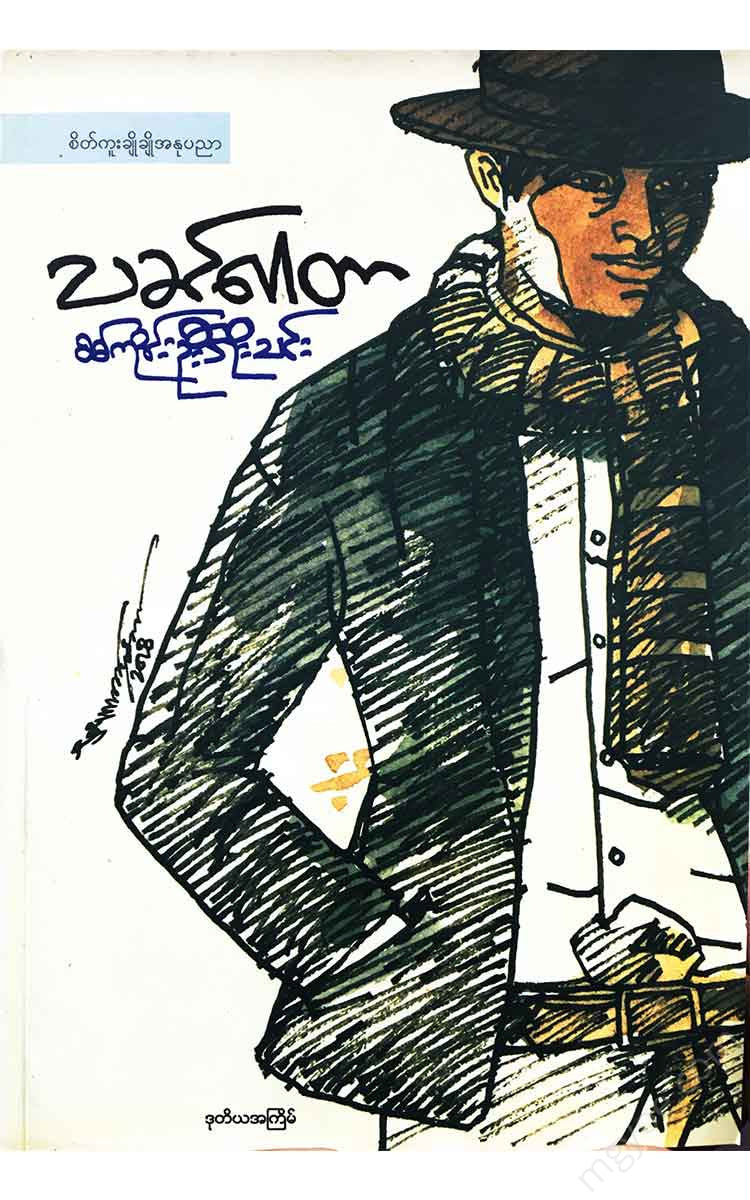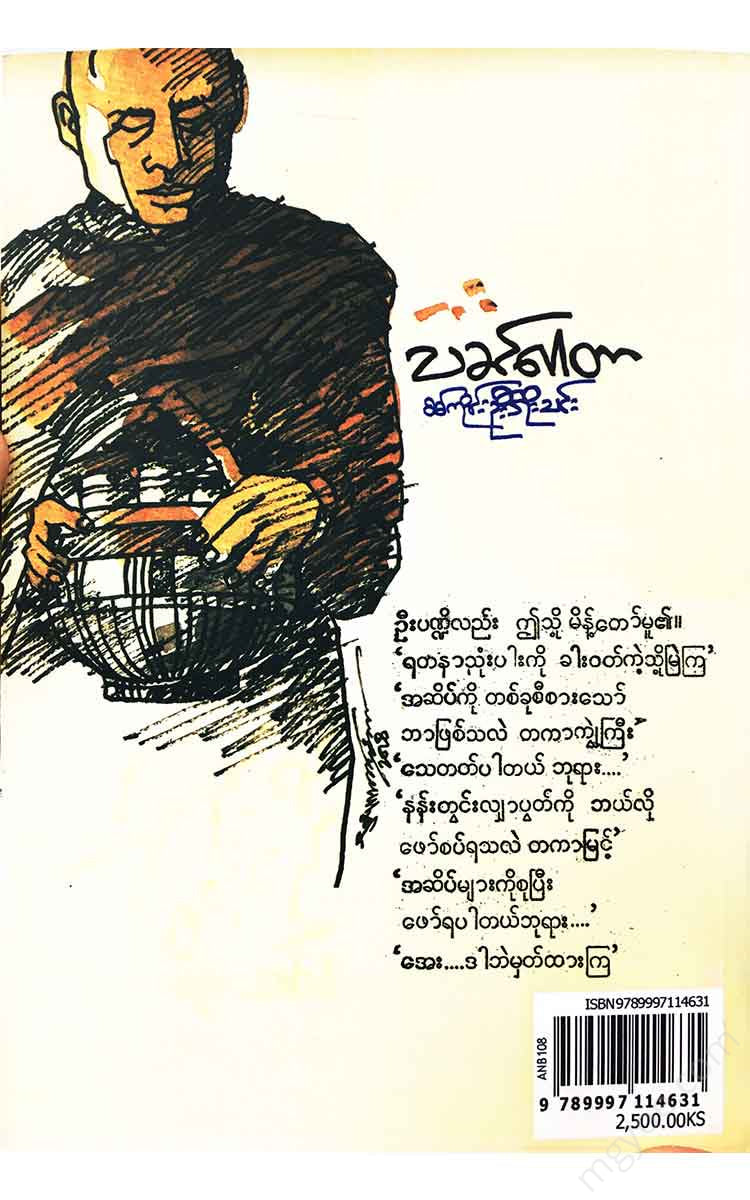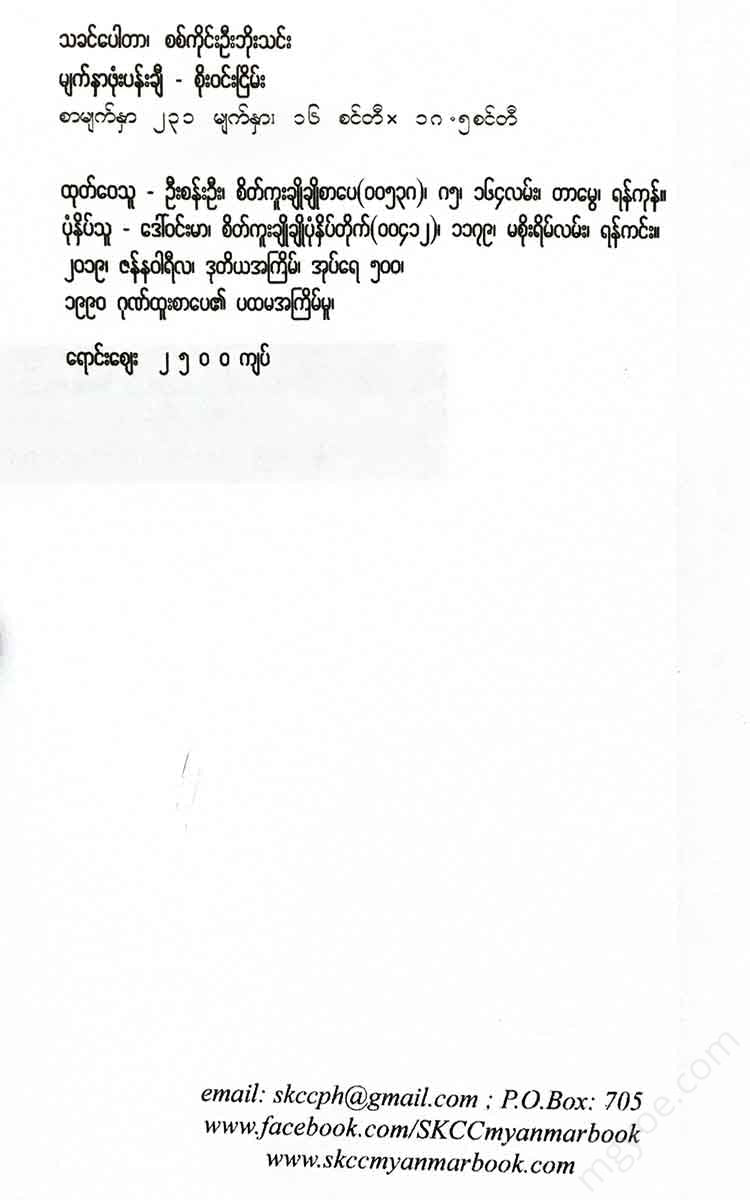စိတ်ကူးချိုချိုစာပေ
Sagaing U Bo Thin - Lord Porter
Sagaing U Bo Thin - Lord Porter
Couldn't load pickup availability
Yes, yes, really yes. Why is that?
Some say to write articles. Some say to write nature stories. Some say to write novels. Some say to write all kinds of stories, and some say that you are a coward if you don't. The publisher wants you to write a book to make money.
I am not a person who has attained the knowledge of food and nutrition, who has been worshipped by the upper classes of people throughout the ages, who has never met a monk or a monk, and who has not attained the knowledge of food. If (don't laugh) the gods had not helped me and attained the knowledge of food, I would not have dared to do so. Because I have to keep asking the gods for clothes and changing them, and I think that the gods cannot give me clothes.
No matter what, no matter how poor or hungry I am, and if I eat well, I can live happily, but my housemates, who are working hard to keep me healthy and well-fed, are people who want to live in a modern and beautiful way, and they are also people who want to look very beautiful. In addition, they want to be hospitable to guests who come to their house.
Therefore, even if I can't eat anything else, I write with my heart and soul, and I don't talk to people. I have never eaten with people who are in the mainstream of the era, even to this day.
My friends and I say that I am not a Buddhist. My dear friends, non-Buddhists say that I have no religion and that I have a false view. In my time, I have been living as if I were a kind of outcast. Of course, I used to criticize and ridicule those who talked about ancient history, secret signs, etc. I spoke badly of those who practiced fortune-telling, asking spirits, divination, electrocution, lighting fires, and pilgrimages. I will not talk about the modern-day monks and monks who fight each other. It is impossible to finish writing about all the evils in this world. There are also many who are afraid of ghosts,
The point to consider is this: The definition of being is the five aggregates of form and name, which are not free from defilements (defilements).
Among these beings, snails, snails, chickens, birds, dogs, cows, humans, etc., are called dust. Hell, demons, spirits, etc., are called material beings, which appear through the mind's examination.
The misty state is established by the movement of the five aggregates (or) form and name, while the material state is established by the movement of the five aggregates (or) form and name.
This means that the dust that has the nature of an animal, a dog, a cat, and a human is predicted and prescribed as a dog, a cat, a chicken, a bird, a human, etc. Due to the material nature of the five aggregates of form, name, and body, the material nature of hell, animal, demon, deity, and Brahma is predicted and prescribed.
Therefore, when beings of material nature, such as spirits and demons, encounter people of human nature, they tend to become emotionally attached to them and act accordingly.
If the Nippā texts were to be published, the learned scholars of the time would lament that they would be as stingy as a worm and vomit it out. (If the context is consistent, the twelve foundations and eighteen elements can be clearly explained and analyzed.)
It's here. Believe it or not?
There is a big red building in a big city. That big red building was built during the Burmese government, and the bricks were red because they were built only with the sun. The real reason is that the mud was broken and the king left it.
For many years after the English arrived, the continent was almost uninhabited, and no one dared to enter the vast expanse of the continent in the evening. It was reported to be very dry.
In that land, when they sleep at night, they don't raise their heads. They drag their feet. They don't dare to show them anything scary. Even if they recite prayers, read the mantras, etc., they can't protect themselves from these feelings.
Despite all the protection offered by sorcerers and magicians, he was unable to do so. (He even wanted to reveal the name and location of the city. He didn't dare to reveal it.)
As a result, that red building has become a haven for pigeons, squirrels, and stray dogs.
Thus, Burma entered the era of the Ninety-One Administration. During that era, no one in that big red building was left behind.
Not far from that great land, there was a pagoda. Within the pagoda's grounds, Maung Chantha and Ma Kywe, who were very poor, had come from a small village near the waterfall mountain and were living in a dilapidated hut, making a living by fishing.
A young monk would often come to that poor man's house and offer alms. Some people said that he was a monk.
One day, the rich man who owned the big red house told Brother Chan about the house and said that he was happy to live there. Brother Chan told the monk who had come to him for alms about it, and they talked like this.
"Daka...do you have it?" "No, sir."
"What about God?" "No, God."
"Namo Tasaka" "I can't do it, God."
The young monk, who had come to Maung Chan and offered alms, taught Maung Chan and his wife the three things: Namo Tassa, Buddham Saranam Gaccsami, Buddham May Saranam Anyam Natthi, and then returned home.
The hut where Maung Chan and his wife were staying was in such a dilapidated state that it was almost impossible to live in. The couple were also very poor.
Maung Chantha sells water, but takes only the price paid by the buyer. He does not ask how much the water costs, but he does it with a pure heart and does not neglect his duties towards his wife. The wife also fulfills her duties towards her husband and listens to his words. She believes in her husband as her confidant and confidant. She does not even think of her husband as her confidant. The husband also follows his wife's wishes and does not speak harshly to her. He does not talk back, etc., but always shows a cheerful face and gives her all the money he earns.
The couple, who were born in the same family as each other, never had any quarrels or grudges from the day they were born. However, they were still poor, uneducated, and of lower class.
Maung Chan told the owner of the big red house that he would live in that beautiful house, haunted by ghosts and monsters, and he agreed. The owner of the house allowed Maung Chan and his wife to live there.
The king gave Maung Chan and Ma Kywe permission and even gave them money, but they refused to accept it. The king thought that Maung Chan and his wife would definitely run away, so he even gave them a small, hand-made lantern.
When Maung Chan and Ma Kywe lived in that house, they would light a small hand-held lamp at night, and not only would the place not be haunted by anything, but they would not even show any signs of being haunted.
Maung Chan and Ma Kyaw slept like that for three days, but they didn't see any signs of a ghost. They didn't believe that there was a ghost or that it was haunted.
The brothers chanted the Namo-tassa Bhagavatav... which the alms-giver had taught them three times. After chanting the Buddham saranam gacsami, the Dhammam saranam gacsami, and the Sangha saranam gacsami three times, they went to bed chanting the Buddham saranam anyam nathi, the Dhammam saranam anyam nathi, and the Sangham saranam anyam nathi.
I wonder if those verses are mantras to scare away ghosts. They are verses recited during the practice of the precepts, and are merely meant to remind us not to lose our senses and to show that there is nothing to worship except the Three Jewels.
Maung Chan was just a couple who had moved from a small village to the city to work, and they had only studied in the second grade at this rural school. Why didn't the ghosts scare them? Didn't the ghosts dare to scare them? Humans are the most noble of all living beings, and only humans can become Buddhas, monks, and Buddhas. It seems that other living beings don't dare to look down on people who are full of human nature.





